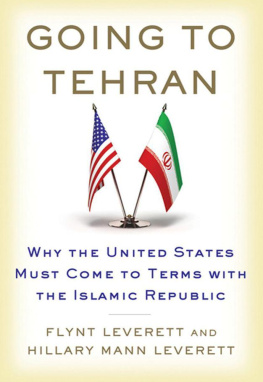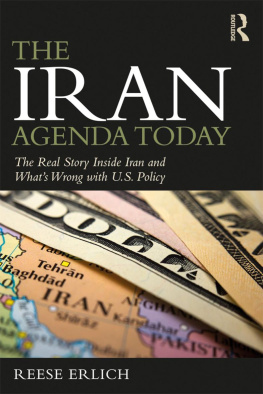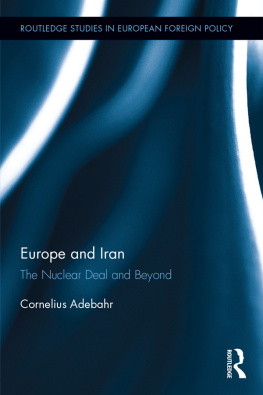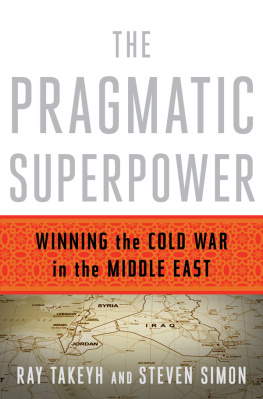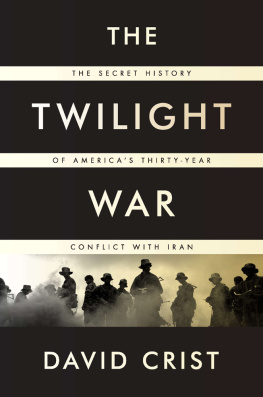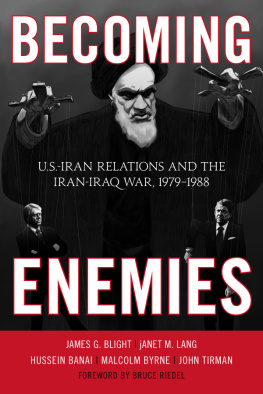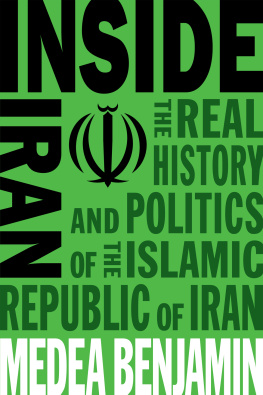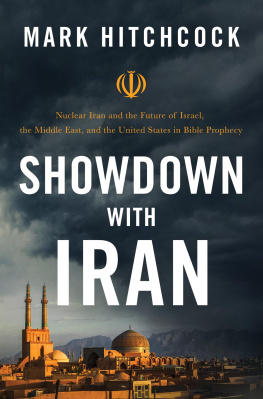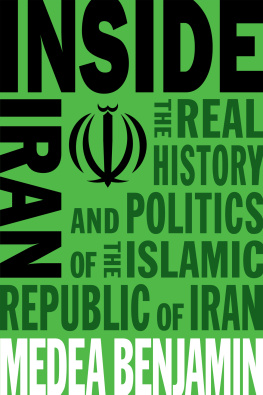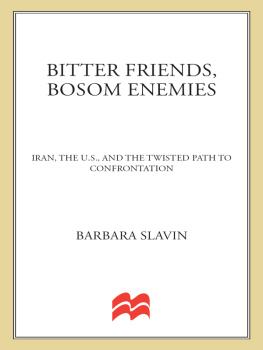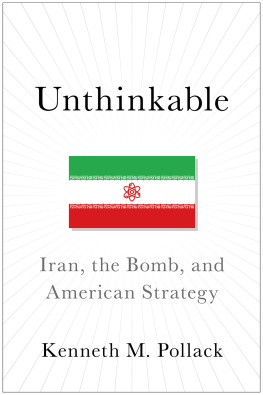The author and publisher have provided this e-book to you for your personal use only. You may not make this e-book publicly available in any way. Copyright infringement is against the law. If you believe the copy of this e-book you are reading infringes on the authors copyright, please notify the publisher at: us.macmillanusa.com/piracy.
For if we should perish, the ruthlessness of the foe would be only the secondary cause of the disaster. The primary cause would be that the strength of a giant nation was directed by eyes too blind to see all the hazards of the struggle; and the blindness would be induced not by some accident of nature or history but by hatred and vainglory.
INTRODUCTION
WILL THE UNITED STATES LOSE THE MIDDLE EAST OR COME TO TERMS WITH THE ISLAMIC REPUBLIC OF IRAN?
More than thirty years after a revolutionary movement inspired and guided by Grand Ayatollah Seyed Ruhollah Khomeini forced the last shah from Irans Peacock Throne and assumed power, most of what even well-educated Americans think they know about the political order that Khomeini and his followers establishedthe Islamic Republic of Iranis wrong. In this case, ignorance is not bliss but a source of grave danger, for the United States is courting strategic disaster by persisting in a fundamentally hostile posture toward the Islamic Republic.
From the earliest days of the Islamic Republic, many Americans have believed that their country has legitimate grievances against it. Such belief conditions an attitude in which it is incumbent on Tehran to address these grievances and accede to American preferences about the Middle East and its future before U.S.-Iranian relations can improve. But in reality the United States needs, for its own interest, to come to terms with the Islamic Republic. To some, this statement may seem unduly apologetic with regard to postrevolutionary Iran, and perhaps even anti-American. It is neither. To let grievances (imagined or real) and hegemonic pretension prevent the United States from doing what its interests manifestly require is the truly anti-American position.
Since World War II, and especially since the end of the Cold War, Americas status as the preeminent power in the Middle East has been crucial to its global primacy. Its capability, alone among the worlds major powers, to project conventional military force into the Middle East has enabled it to assume responsibility for the physical security of the oil and gas flow from the Persian Gulf on which the global economy depends, and to become the presumptive enforcer of order across the Middle East. This muscle has given the United States extraordinary economic and political influence in the region, and it has reinforced American dominance in other important parts of the world. (As a senior Japanese diplomat told us, if the United States did not guarantee the flow of Persian Gulf hydrocarbons to Asian markets, it would lose its Asian allies.) In the postCold War period, preeminence in the Middle East has buttressed Americas claim to leadership in international economic affairseven as the country continues losing ground to foreign competitors and setting records as the greatest debtor nation in history.
But the order in the Middle East that Washington has worked over decades to consolidate is eroding. To be sure, the United States will, for the foreseeable future, retain its unique ability to project military force into the region; no other power is capable of playing its enforcer role, or will be for years to come. But military capacity is less and less relevant to the challenges America faces there.
For our part, the two of us have been arguing since 9/11, inside and outside American administrations, that the United States strategic position in the Middle East is at serious risk, in large measure because of U.S. policy mistakes, and that these mistakes stem from the same source: a postCold War temptation to act as an imperial power in this vital part of the world. Instead of dealing soberly and effectively with the regions complex political and security dynamics, the United States has tried to remake the Middle East in accordance with American preferences and with scant regard for Middle Eastern realities.
For the past twenty years, America has not There is also Washingtons perpetual insistence that everyone in the region not just accept Israel but tolerate virtually any definition of its security requirements and territorial needs put forward by the Israeli government. This agenda has pushed pro-Western regimes to line up against their own populations most deeply held values, interests, and political preferences. In effect, the United States has forced its partners to be soft on Israel but hard on local Islamistsin the long run, an untenable position.
This imperial turn in Middle East policy has proven not just quixotic but deeply damaging to American standing and interests, in the region and globally. In particular, it ignores a lesson that balance-of-power theorists, foreign policy realists, and astute students of international history all know: while hegemony seems nice in theory, in the real world it is unattainable; not even a state as powerful as the United States coming out of the Cold War can achieve it. Indeed, pursuing hegemony has made the United States weaker. Of course, the temptations of empire have lured great powers before it into what the historian Paul Kennedy has called imperial overstretch.new record for the largest amount of influence and wealth squandered by a great power in the shortest period of time.
As part of this imperial turn, the United States has systematically demonized would-be challengers to its primacy in the region, a practice whose most significant strategic consequence, in our view, has been a persistent refusal to come to terms with Irans postrevolutionary order. Besides working to isolate the Islamic Republic diplomatically, press it economically, and foment its collapse, Washington has sought to exclude it from the mainstream of regional affairs. It clearly signaled this approach at the beginning of the postCold War period, as American power seemed at its height, when the George H. W. Bush administration organized the October 1991 Madrid conference. Convened ostensibly to relaunch the so-called Middle East peace process, the conference was really meant to convince Arab states to buy into a new, highly militarized and U.S.-led regional political and security order in return for vague promises of American leadership in Arab-Israeli peacemaking. The George H. W. Bush administration made a point of excluding Iran from Madrid; from its perspective, there was no place in the new order for the Islamic Republic. That exclusion became the template for Washingtons postCold War Middle East diplomacy. Every subsequent administration has used the Arab-Israeli peace process to marginalize the Islamic Republic.
Successive administrations have developed three major complaints to justify their antagonism toward the Islamic Republic: its drive to produce weapons of mass destruction, its support for movements that Washington considers terrorist organizations, and its violations of human rightsthe same trifecta of alarms the United States used to justify regime change in Iraq. But not only has the Islamic Republic survived; following the end of the Cold War, it emerged as the de facto leader of challengers to American ambitions to consolidate, in partnership with Israel, a dominant position in the Middle East. Thus the United States and Iran have become the leading antagonists in a struggle over American primacy, a new Cold War in which Americas approach to Iran has grown ever less receptive to serious, strategically grounded engagement and ever more oriented

